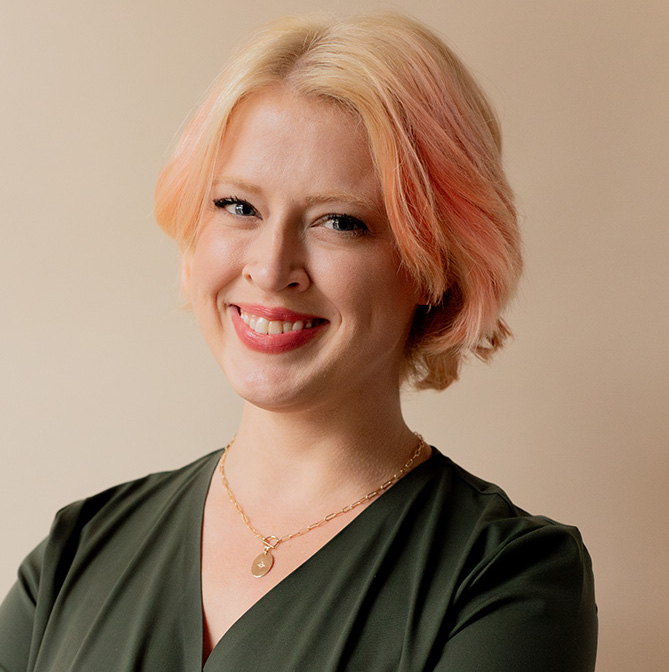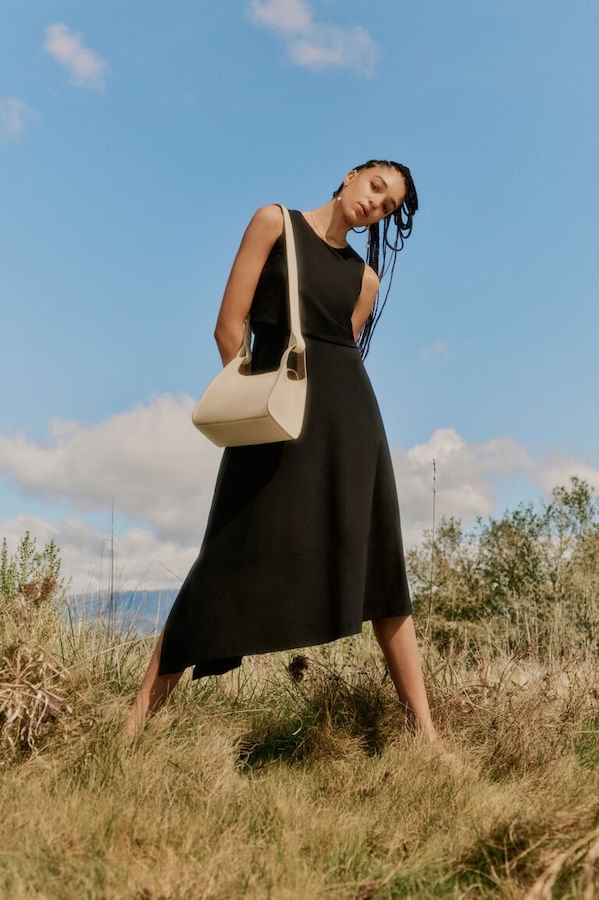
How To Respond To “Tell Me About Yourself”
We’ve all been there before: After a few cheerful hellos, a silence falls between you and someone else — maybe it’s a job interviewer, a friend of a friend you’ve never met, or a first date. Where do you go from here? In a job interview, you likely expect the recruiter to dive into “so, tell me about yourself.”
Socially, you might get a less stilted (but still awkward) version of the question — my go to is “so, what’s your story? Tell me who you are as a person!” Either way, that question can open up a portal to the universe. When I’m on the receiving end of it, I can’t help but go blank and think, Wait, but who am I, actually?? A simple question, turned existential.
Cue the hello darkness, my old friend recurring gag from Arrested Development. 🎶😵💫
“What’s your story? That question opens up a portal; I can’t help but go blank and think, Wait, but who am I, actually?? A simple question, turned existential.”
But this question shouldn’t have to evoke fear or doubt. It’s also not requiring a bulleted list of your education, accomplishments, and professional role, even when asked in an interview situation. Instead, this question, and ones like it, are an open door to connect with someone a little further, to share who you are and perhaps most importantly: how you tell your story.
As someone who has been on the interviewer side for the past several years, whether I’m meeting with job applicants, connecting with new folks at conferences, chatting with sources for stories, or even first dates, it’s actually the storytelling factor that I’m most curious about. What is important to you? What values and characteristics do you hold at the forefront of your life, and how excited are you to share them? Sure, tell me where you’re from, what you’ve studied, and what roles you’ve held, but I also want to know things like your lowest-stake hot takes or the strangest food combination you love.
(For the record, mine are: anything can technically be called a bead if you put a string through it, and cottage cheese & applesauce, respectively.)
Ultimately, there’s no secret formula to cracking this question. But I’ve gathered notes from my own experience, as well as reached out to a few varied experts in the field — a communication expert, psychotherapist, and even a casting director — to help point us all in the right direction. Whether you’re prepping for an interview, or just wanting to perfect your intro for dates or networking, here’s how to build a thoughtful reply to “tell me about yourself.”
Get to know yourself first
This one might seem obvious, but it might be the most difficult. Take yourself on a date and get to know who you are at your core. Here are some questions I like to explore:
- What do you hold as core beliefs — the convictions you carry about yourself, others, and the world?
- What are your values? (I like this quiz to help me identify my own values.) These are different than our core beliefs, and serve as tools for measuring worth and meaning in our lives.
- What are the top defining moments in your life? Why and how have they contributed to who you are today?
- What work do you find most fulfilling, either personally or professionally?
- Which connections in your life bring you the most joy, and what patterns do they share?
- What do you consider your strengths? How about your weaknesses? In which of these areas do you truly desire to grow?
- When do you feel most in a state of flow? What are you doing, where are you at, and who are you with?
- What would the child version of you say to your adult self? And what would your adult self say in return?
- If you woke up tomorrow and every obligation, problem, or conflict was resolved — how would you spend your time?
You can journal responses to these questions, or simply sit with one or two of them at a time. If there are any questions that are more difficult for you to answer, maybe you haven’t quite explored that area of your life deeply enough. (Or maybe the question simply doesn’t resonate with you, that’s okay too!)
“Your response to ‘tell me about yourself’ can — and should — evolve over time as you move through life.”
Getting to know ourselves is a lifelong journey, so don’t worry if you feel overwhelmed by these questions. Take them one at a time, and at your own pace. Your response to “tell me about yourself” can — and should — evolve over time as you move through life. Ready for more? Here are more helpful exercises for self-discovery you can add to the rotation.
As you gain more clarity on who you are at your core, it’s time to get practical.
Evaluate the context of the question
Shoutout to my middle school English teacher for the next tool — the five Ws! When someone asks you to tell them more about who you are, consider the context: who, what, when, where, why (and the tagalong, how).
This should help you narrow down which thread to start following. For example, in a job interview you’ll want to stick mainly to your experience and training related to the role you’re seeking. But even then, it’s important to share yourself authentically and honestly — because if you secure a role or begin a relationship based on a false persona, you might find yourself working against your own values.
“You are not your job title, your resume, or even your past—you are a living story still being written,” urges Monika Aman, a psychotherapist and founder of the blog Wholenessly. “When we’re asked to introduce ourselves, it’s not about performing or perfecting. It’s about offering one honest window into who we are becoming.” Find the context, but remain true to yourself in your answers.
“When we’re asked to introduce ourselves, it’s not about performing or perfecting. It’s about offering one honest window into who we are becoming.”
– Monika Aman, psychotherapist and founder
If you want to add your own context, you can also always repeat the statement with an additional note. That way, the asker can hear how you’ve understood the question, and where you’re going to take your answer. “I’m happy to tell you about my most recent experience,” or “I’d love to tell you more about why I feel like I’m a great fit for this role” might be good responses for an interview interaction.
If you’re in a social situation, you can speak to how you are connected to the occasion: “I know [so-and-so] through our time spent volunteering together, I’d love to tell you how we met — it’s a funny story…” or “I came to this craft night meetup because I’ve been crocheting since I was eight years old, and I’m new to town hoping to make some local friends.”
If you’re really stuck, Aman offers this starting point that can work for social and professional settings: “Choose two core values you’re currently living into — like ‘curiosity’ and ‘steadiness’ — and then share a small, true story that reflects those,” Aman recommends. “This makes your response more grounded, warm, and real—whether you’re in a job interview or connecting at a dinner table.”
But don’t stop after telling your story — next, it’s time to ask for theirs in return.
Return the question
Your approach to reciprocating the question should also keep in mind the 5 Ws I mentioned earlier. You may not want to ask a phone screener to share their story when you’re an applicant, at least right away. Instead, in an interview setting, you can inquire if they want to hear more about any particular experience that you have shared (or that was listed on your resume).
But socially? This step is essential. As someone who returned to the dating world after fifteen years in a partnership, I could immediately suss out who I’d be able to form a genuine connection with based on whether they asked me questions in return. If you’re not comfortable asking big or creative questions to start with, take your conversation partner’s lead and return the exact question they asked you.
“If you’re not comfortable asking creative questions yet, take your conversation partner’s lead and return the exact question they asked you. Reciprocation goes a lot further than silence.”
Reciprocation goes a lot further than silence, I can tell you that.
“Conversations are bricks that lay down the foundation of connection,” says Kate Terentieva, a communication expert and founder of Off The Record (a connection card game that helps build deeper relationships). “When we talk, we share. When we share, we connect. You won’t believe how far you’ll go in this world, when you just take the time to cultivate relationships with other people — whether professional, platonic, romantic, and everything in between.”
Terentieva suggests approachable and playful responses, such as sharing your superpower or agreeing to set a timer for sixty seconds. “Popcorn the prompt back to them,” says Terentieva, “so that they also see your interest in learning more about them.”
If you’re truly feeling stuck and your chat stalls, scroll through some of these conversation topics and keep a few in your back pocket. Conversation can sometimes be like spinning your wheels in mud — all you need is a little traction to get the vehicle going again.
“When we talk, we share. When we share, we connect. You won’t believe how far you’ll go in this world, when you just take the time to cultivate relationships with other people — whether professional, platonic, romantic, and everything in between.”
– Kate Terentieva, communication expert
Practice makes perfect
At the end of the day, we’ve all had those palm-to-forehead moments where we ask ourselves why did I say that? Introducing ourselves in any setting is never going to be a perfect science, and I’ve certainly flubbed my way through a couple first encounters with folks.
But those mistakes also matter — a perfectly-polished elevator pitch doesn’t always feel human. A joke, a smirk, a pause or filler word can all humanize you in ways that make people want to spend more time with you. At least, that’s how I’ve always seen it. Be a person first, the rest of your skills, values, knowledge, and qualifications will follow.
But what if you feel like you really missed something? You can also follow up, when it feels appropriate. If you’ve just been interviewed, consider sending a thank you email or note that includes some details about your conversation, and any additional information you left out the first time. If it’s a social engagement and you’ve connected with the person via phone or Instagram, send a message to say how you enjoyed meeting them. Add in an anecdote of how else you might get along beyond your initial meeting!
I’m a firm believer that first impressions matter, but they’re not as telling as future interactions if you have a chance to make them — stay consistent, honest, and genuine, and that’s what truly makes a difference in a long-term friendship, relationship, or fulfilling working partnership.
“Stay consistent, honest, and genuine — that’s what truly makes a difference in a long-term friendship, relationship, or fulfilling working partnership.”
Ultimately, the directive of “tell me about yourself” isn’t based entirely on the content of your response. Whether it’s a personal or professional connection, you’re pitching your personality and demeanor. “At the end of the day, it comes down to who you want to work with: who you want to spend your entire day with, week after week,” says Lana Veenker, a US-based casting director and the President of the International Casting Directors Association.
In Veenker’s experience, asking actors to describe themselves isn’t about reciting their resume perfectly. “We want to know about you as a person. What are you passionate about? What do you value?” At the end of the day this question opens up an opportunity to stand out from the crowd, while remaining relatable. Veenker asks, “What is something that would make you memorable out of the tons of candidates for a position or crowds of people at a networking event?”
Lean into what makes you you. Even if it’s that you have a hot take about beads, or love a food mixture that others might call “a textural nightmare.” We can only ever benefit from being authentic and honest with each other, when it’s safe to do so.
And that’s the final note I have to offer — sometimes it’s not safe to be our full, vulnerable selves. Sometimes your gut tells you not to share your story with someone. I’ve been there. Especially when it comes to matters of safety, it’s okay to divert the conversation, bend the truth, or leave with little to no explanation. You do not have to reveal yourself if it puts you in danger. Stay safe, and stay true — first and foremost, to yourself.
As all the disconnection is happening in the world today, especially as we continue further into the virtual, remote-first age, I do hope you can get the chance to tell someone about yourself this week — and to hear them in return.
If you want, share your response to “tell me about yourself” in the comments below. Formulas for responding are also more than welcome! Xx
Emily McGowan is the Editorial Director at The Good Trade. She studied Creative Writing and Business at Indiana University, and has over ten years of experience as a writer and editor in sustainability and lifestyle spaces. Since 2017, she’s been discovering and reviewing the top sustainable home, fashion, beauty, and wellness products so readers can make their most informed decisions. Her editorial work has been recognized by major publications like The New York Times and BBC Worklife. You can usually find her in her colorful Los Angeles apartment journaling, caring for her rabbits and cat, or gaming. Say hi on Instagram!




